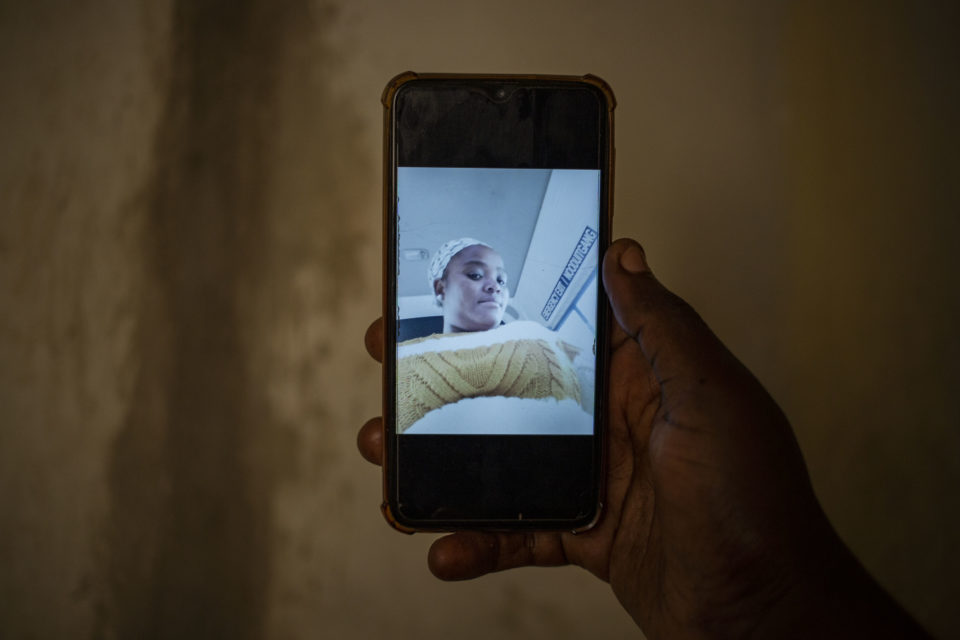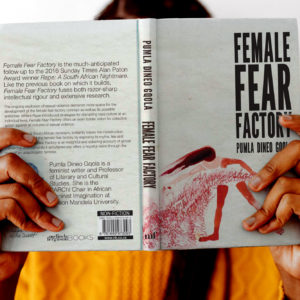Stuck in the colonial mire
For as long as we treat some lives as disposable, we will not escape the colonial logic that continues to mutilate society and corrode possibilities for a just and viable future.
Author:
6 August 2021

New Frame reported this week on the death, as a result of a police bullet, of 32-year-old Zamekile Shangase in Madlala shack settlement near Lamontville in Durban, KwaZulu-Natal.
Shangase was killed during a raid – the second in Madlala – in which the police, ostensibly looking to recover goods taken during the riots in July, went from door to door breaking locks, entering homes and seizing food. She was unarmed and, contrary to reports elsewhere, no one fired on the police during the raid. Her body lay next to her home in the settlement’s Asiyindawo section, her blood turning the soil to mud as the raid continued.
Shangase was a child to her parents, a parent to her two children, a life partner, a neighbour, a comrade and a congregant. She had served a term as an elected leader in her community. But her death will pass without creating a national scandal. It will not come to mark a break in the passing of political time. People will not take to the streets in a collective refusal to accept that the state continues to employ murder as a routine tool of governance.
Related article:
It could be argued that in the context of at least 337 deaths during the food riots, looting and organised sabotage in July, we simply don’t have the capacity to take on the enormity of another death. But, outside of the horror of what happened in Phoenix, we have not made any real effort to take the full measure of those deaths. At the moment they are just numbers, without names or context.
The murder of Shangase is not an aberration. It is not particular to this time of crisis. The police and other armed forces that are directed by the state murder people all the time during electricity disconnections, evictions and protests. It is rare, very rare, for these murders to become a matter of national importance.
In many societies, the state murdering one person can lead to mass protests, to days of riot. Not here.
Silence and complicity
It is not that we lack the capacity to be shocked. We all know that if the police went from door to door in a gated community in uMhlanga, forcing their way into people’s homes, seizing their property and then shooting and killing an unarmed white woman, it would cause a massive national and international scandal. We all know the rules that govern whose lives count and whose do not, and how they are structured by race, space and class.
These rules are not an aberration particular to our society. Writing about the shantytown in the settler colony, Frantz Fanon observed that in the eyes of the coloniser “[t]hey are born there, it matters little where or how; they die there, it matters not where, nor how”. This colonial logic was not undone when the flags of the European powers were lowered. It holds, to different degrees of intensity, from Nairobi to Paris and Chicago.
In South Africa, the lives of people who are impoverished and Black are usually only retrieved from systemic exclusion from the count of those whose lives are accorded weight and dignity when their deaths are spectacular.
Related article:
We remember the murder of Ernesto Nhamuave, who died in the Ramaphosa shack settlement on the East Rand during the xenophobic pogrom of May 2008, only because there was a photograph of a man in flame. The police murder of Andries Tatane in Ficksburg in 2011 entered the national consciousness because we saw him die on television.
We remember the massacre of 34 striking miners at Marikana in 2012 because of its scale, and because it was televised. We remember how, in 2013, Mido Macie was dragged behind a police van in Daveyton before being beaten to death inside a police station because we saw the officers’ sadism in a video.
The murder of 11 people by the police and the army during the first lockdown last year was noted because, in a highly unusual set of circumstances, the Covid pandemic generated a temporary sense of a set of shared experience across class.
When injustice festers, passivity is acquiescence and acquiesce is complicity. There is a significant degree to which the state is a predatory excrescence on society, a vampiric presence, but it is not solely that. The state is entangled with society and, ultimately, authorised by it.
Unlike in Paris, London, Athens or Minneapolis, we do not take to the streets when confronted with state murder. In most cases, there is not even a public discussion.
Social abandonment
And, of course, the colonial logic that ranks the value placed on life is not only the preserve of the state. As in Mexico or Jamaica, we kill each other at a staggering scale. Political, criminal and domestic violence are all routine. In our cities, we periodically form mobs and murder and maim people who arrived from another country, or from what we deem to be the wrong part of this country.
This logic is not solely expressed in the form of murder. It is also present in the politics of social abandonment. This was brought home to the middle classes when 143 lives were lost, some to starvation and dehydration, in what has become known as the Life Esidimeni tragedy. But social abandonment is a structural feature of our society.
We leave people to suffer and die. People are left to endure hunger and cold, pain dulled by heroin, lives without the possibility of work or an income, lives made in mud and fire. People are placed in schools that maim possibility and prisons that violate dignity, autonomy and safety. Nothing is done to change the fact that women are not safe at home, at work or in the streets.
Related article:
Achille Mbembe describes the enduring logic of colonial forms of authority as “the capacity to define who matters and who does not, who is disposable and who is not”. People are not only rendered disposal by the gun. And the count of who is rendered disposable is not solely a material question, or a question of land, houses, schools and jobs.
It is also a matter of who can be criminalised with impunity and who cannot, who is taken as a worthy and credible participant in the public sphere and who is not. Everyone with the right papers can cast a vote for competing elites, but not everyone is assumed to have an equal right to participate in democratic disputation.
How often have people who appropriated food in the July riots been given space to say what they wish to say about their lives and their relation to wider society? How often have people who know nothing at all about the lives of the oppressed, who were not present when the social order was temporarily ruptured and who have not spoken to anyone who was there been given space to express their assumptions and, frequently, their prejudices?
We all know the answers to these questions.
Expertise is frequently taken to be a matter of certification and institutional location rather than credible knowledge. It is not unusual for some forms of certification and institutional location to reward certain forms of ignorance and contempt. Conformity to the common sense of elite society is systemically rewarded.
An emancipatory kernel
Democracy, as any first-year student of politics should know, means the power of the demos, the people. No liberal democracy takes this seriously. But in South Africa, like in India, Kenya or Mexico, the prospect of real democracy, or even brief moments in which the oppressed enter elite spaces with autonomy rather than subordinated as workers or recipients of welfare, charity or education, is met with a particularly intense horror.
There are times when the rupture in the day-to-day order of life is horrific. Here, as in many other countries, the oppressed periodically turn on each other. This is actively encouraged by elites who have a direct stake in the expression of popular anger along horizontal rather than vertical lines.
But this is far from the full picture. Sustained forms of democratic organisation are present and significant although, in numerical terms, rare. And there is often an unrecognised emancipatory kernel within less-organised and sustained moments of rupture.
Related article:
As is the case in cities across the Global South, the protests of impoverished people often take the form of road blockades marked out by tree branches, the debris of the crumbling infrastructure of shared life and burning tyres. In elite society they are often just reported as traffic incidents.
The function of relentlessly describing them as “service delivery” protests is to say that the oppressed do not and cannot desire and demand anything more than the means to sustain bare life, that they accept their assigned place in society. The function of routinely ascribing them to external agency is to deny the equal capacity for political thought and agency, to say that the oppressed are incapable of autonomous action and must be represented by others who will think and decide for them.
But for those with ears to listen to what is being said or sung, or eyes to see what is scrawled on posters made from cardboard boxes, it is clear that, across the country, there is a key statement that has repeatedly emerged from the protests of impoverished people. In a common formulation it declares: Asizona izinja, Ha re lintja, Ons is nie honde nie, We are not dogs. There are, of course, other formulations, but what they have in common is the insistence that the humanity of the oppressed is systematically denied and an affirmation that it must be recognised.
This is hardly unique to our place and time. Consider, for instance, Saidiya Hartman’s inventive and beautifully written 2019 book, Wayward Lives. She writes of the Black ghetto in Philadelphia, the subject of the great sociologist WEB du Bois’ first book, published in 1899, “as a reserve for the dispossessed and those relegated as fungible, disposable, surplus, and not quite human”. A few pages on a resident of the part of town that would later become the ghetto tells Du Bois of people being treated “like dogs”.
The count of the human
Many among the elite cannot hear or read the defiant humanism on the road blockade, because all they can perceive is a rabble capable of noise but not speech. For those who can hear the words or read the signs, they are often taken as a form of naivety, something not to be taken seriously. They are also often taken as an expression of ignorance, a failure to understand politics, a failure that can be remedied by education delivered from above.
This view is widely held by elites across the political spectrum. It is rare to encounter people who understand that, to borrow a famous phrase from Karl Marx, the educators also need to be educated.
But the perversion that sits at the heart of the logic of colonialism is, precisely, a split in the count of the human.
Related article:
A refusal of the expulsion from the full count of the human must be translated into forms of organisation, political strategy, concrete demands and, eventually, genuinely democratic institutions. But there is a reason that, across the colonial world, the militant affirmation of a shared and equal humanity has inaugurated and sustained revolt, including its most productive forms. Paul Gilroy, the British intellectual, writes of the “humanism of the black Atlantic thinkers”, and even a cursory reading of the great figures of the Black radical tradition – Aimé Césaire, Toussaint Louverture, Frantz Fanon, Steve Biko, Sylvia Wynter and many, many others – shows a continuing affirmation of a militant humanism.
Our situation is far from unique. But that does not diminish its urgency.
Until we resolve the question of the human, until we adopt a genuinely democratic spirit, until empathy is no longer fenced in by colonial logic, the circles of death and abandonment will continue to tighten.





